

Vitamin E & A Razor-Sharp Brain. Vitamin E Keeps Your Brain Razor-SharpFor those with suboptimal levels, it can improve cognitive age by 8-9 years By Aaron W.
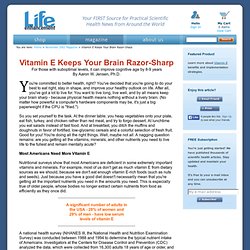
Important Vitamins For The Brain. The brain is the human body's biggest energy guzzler.

The organ responsible for regulating all physical and cognitive processes only accounts for about 2 percent of the body's weight, yet utilizes 25 percent of its fuel supply. To function at peak efficiency, the brain needs constant infusions of vitamins and minerals from blood. When its nutritional needs aren't being met, the signals flashing between neurons may slow down; the membranes that protect brain cells from damage may deteriorate; and the result may be decline in both physical capability and mental acuity.
The eight B vitamins, collectively known as B-complex, are water-soluble, meaning that the body can't store them so the supply to the bloodstream must be replenished daily. The brain needs these vitamins to metabolize fuel -- glucose -- and regulate levels of homocysteine. Neurotransmitters are chemicals released by nerve cells that allow impulses to be conveyed to other neurons. Vitamins For Mood Stabilization. Certain vitamins, along with other nutrients, help the body maintain important mood-regulating functions.
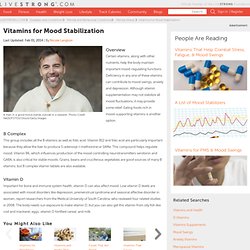
Deficiency in any one of these vitamins can contribute to mood swings, anxiety and depression. Although vitamin supplementation may not stabilize all mood fluctuations, it may provide some relief. Eating foods rich in mood-supporting vitamins is another option. This group includes all the B vitamins as well as folic acid.
Vitamin B12 and folic acid are particularly important because they allow the liver to produce S-adenosyl-l-methionine or SAMe. Important for bone and immune system health, vitamin D can also affect mood. Problems with the body’s cell-protective antioxidant defenses can contribute to depression. Although better known for supporting the immune system, vitamin C can also help the body cope with stress and anxiety. Vitamins for Great Skin/Nutrition. Nutrition and great skin are very much related and some of the nutrients that play an important role in your complexion are vitamins.
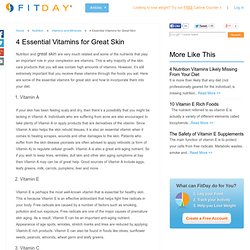
This is why majority of the skin care products that you will see contain high amounts of vitamins. However, it’s still extremely important that you receive these vitamins through the foods you eat. Here are some of the essential vitamins for great skin and how to incorporate them into your diet. 1. Vitamin A. Essential Vitamins. Why do I need to register or sign in for WebMD to save?
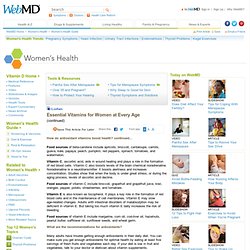
We will provide you with a dropdown of all your saved articles when you are registered and signed in. How do antioxidant vitamins boost health? Continued... Food sources of beta-carotene include apricots, broccoli, cantaloupe, carrots, guava, kale, papaya, peach, pumpkin, red peppers, spinach, tomatoes, and watermelon. Vitamin C, ascorbic acid, aids in wound healing and plays a role in the formation of red blood cells. Folic Acid. Foods Highest in B3 (Niacin) MedlinePlus Medical Ency. Niacin is a type of B vitamin.
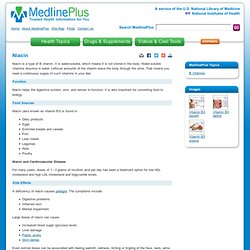
It is water-soluble, which means it is not stored in the body. Water-soluble vitamins dissolve in water. Leftover amounts of the vitamin leave the body through the urine. That means you need a continuous supply of such vitamins in your diet. Function Niacin helps the digestive system, skin, and nerves to function. Food Sources Niacin (also known as vitamin B3) is found in:
First-aid kits: Stock supplies. A well-stocked first-aid kit can help you respond effectively to common injuries and emergencies.
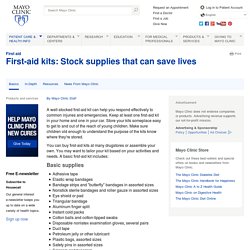
Keep at least one first-aid kit in your home and one in your car. Store your kits someplace easy to get to and out of the reach of young children. Make sure children old enough to understand the purpose of the kits know where they're stored. What to Keep in a First Aid Kit. Get a Container for Your First Aid Kit Your first aid kit should be accessible and portable.
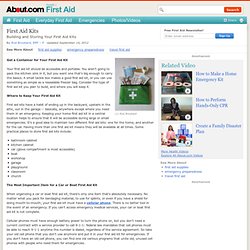
You aren't going to pack the kitchen sink in it, but you want one that's big enough to carry the basics. A small tackle box makes a good first aid kit, or you can use something as simple as a resealable freezer bag. Phenylephrine: Drug Information. <span class="addthisnoscript">To use the sharing features on this page, please enable JavaScript.
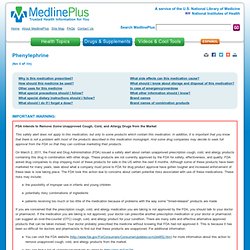
</span> pronounced as(fen il ef' rin) URL of this page: FDA Intends to Remove Some Unapproved Cough, Cold, and Allergy Drugs from the Market This safety alert does not apply to this medication, but only to some products which contain this medication. On March 2, 2011, the Food and Drug Administration (FDA) issued a safety alert about certain unapproved prescription cough, cold, and allergy products containing this drug in combination with other drugs. The possibility of improper use in infants and young childrenpotentially risky combinations of ingredientspatients receiving too much or too little of the medication because of problems with the way some ''timed-release'' products are made If you are concerned that the prescription cough, cold, and allergy medication you are taking is not approved by the FDA, you should talk to your doctor or pharmacist.
Why is this medication prescribed?